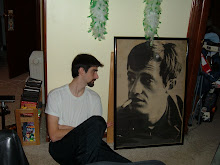One thing that The Band of Outsiders has rarely done is venture into cinema. This is odd because that is what I study in school and am constantly learning about in my free time. What is also odd is that The Band of Outsiders was originally intended to be a critical cinematic exploration into all facets of cinema. One idea was that The Band of Outsiders was going to be an underground magazine with contributions coming from those that seriously wanted to talk about cinema and its importance. But that never got off the ground so I ventured to Myspace with the idea and started to write about films on my Myspace page. That has dissipated and most writings on film are left for academia and The Band of Outsiders has metamorphosed into something else. But I say why not write about film and profess a love of mine?

For All Mankind (Al Reinart, 1989) is a documentary film that explores one of mankind's greatest adventures, going to the moon. Reinart gives us the story of adventure through the voices of those who embarked on that adventure, the astronauts. Reinart compiles footage that was shot by NASA into a succinct personal experience. Reinart's film also allows us to contemplate on our world today by examining the experiences of the past.
The first footage of the film is of President Kennedy famously declaring that America will go to the moon and after that we are put into the world of the astronauts. As the astronauts are showed preparing for launch, traveling in earths orbit, heading to the moon, and then being on the moons surface the personal retelling of emotions and feelings compliment the restored footage of a by gone era.
Being forty years removed from when Neil Armstrong first stepped onto the surface of the moon there is a sense of amazement in the accomplishment of landing on the moon. Armstong's famous first steps and words may be cliché now but when taken in from the point of view from mission control and the faces of those watching there is a renewed wonder in seeing the first man on the moon. As subsequent visitors of the moon discuss their adventures it becomes apparent that what was accomplished in a short period of time was absolutely immense. What also becomes apparent is the massiveness of space and earth within in it.
Many of the astronauts, as they express their views of orbiting earth, find a sense of home and they express the importance of all parts of the world. In one shot their is footage of small orange dots speckled across the night landscape of Africa. Those orange dots are fires where people have created a living area. The enormity of Africa in daylight is desert and all of the reasonable learnings of inhospitably of such a climate seem lacking when viewed during the night. It's as if Reinart allows us to understand that home is home regardless of our preconceptions. There is that same feeling as the astronauts discuss leaving the moon. For some the barren rocky world had become a home, and as the lunar capsule departs the surface, home once again disappears for the astronauts.
For all Mankind does not only show us the adventure but explains the purpose of the adventures to the moon. It may seem that our reasons for space exploration and exploration of the moon were political in nature but for those scientists and astronauts the journey became something more. The harsh landscape of the moon became a playground for science but also a place to prove the determination and resolve of a nation. The moon was not only for us but for all of mankind. How can this be?
Upon its initial release in 1989, Reinarts film can be seen as nostalgic and a film that offers a glimpse into history that was rarely seen. In 2009 as earth faces many tough questions on climate change and global warming, For All Mankind seems to be a form of positive evidence that in a short period of time, with determination and resolve, things can change and be accomplished. For All Mankind also seems to become a statement for mankind to explore the importance of our world. It's easy to say that we can put a man on the moon but we can't...(fill in the blank) as a funny type of argument. But such arguments may prove our shortcomings when dealing with serious issues. For All Mankind shows the beauty of not only the moon but also of our planet and what can be accomplished. As we look up into our respective night sky's let us imagine with wonder what it must be like to be in such a place but also how important the place that we are standing on is.

No comments:
Post a Comment